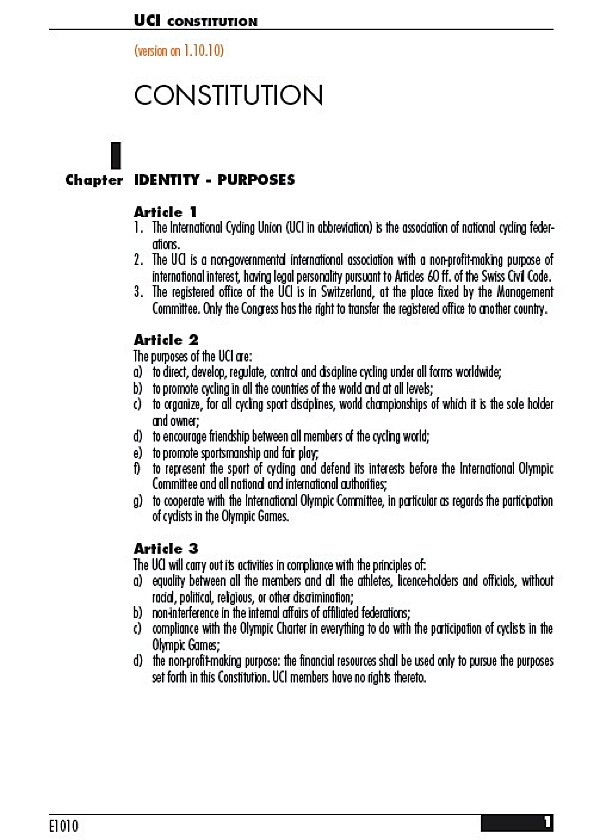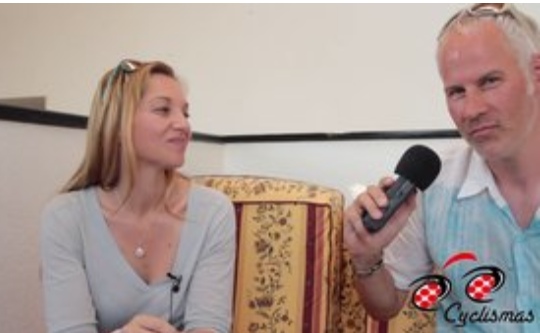The Tour of Beijing concluded on Sunday with muted fanfare. While I was coming to grips with the events of the past two weeks – everything from leaked letters to team sponsors, to doping tests never performed by the UCI at races this year where they ran the doping controls, to in-depth analysis and revelations by @fmk_RoI of the revenue-sharing debate – Andrew Hood from VeloNews did an interview with my real-life counterpart. In that interview, “McQuaid the Just” made the following comment when Hood asked about allegations that teams were threatened and forced to attend the Tour of Beijing:
Not at all. We were being strong-armed by them, we were the ones being blackmailed by the teams. We had to fight fire with fire. That’s business. That’s normal negotiations between parties.”
There has been a fundamental shift in how the UCI has done its “business” since the election of Hein Verbruggen to the position of UCI president in 1991. Originally the UCI was created as a non-profit entity to represent cycling’s interests at the Olympic Games, to preside over the World Championships, and to promote the brand of cycling worldwide. This is reflected in the first three articles of the UCI Charter, which states the following:
According to paperwork on file in Switzerland, the UCI is still a non-profit entity, but somewhere along the way, those at the top of the organization have lost the plot and forgotten the mission of this organization.
Most governing bodies of sport involve themselves only in the administration of international competition: in the form of yearly world championships where teams are chosen/determined by the national federations that participate; in competitions at the Olympics where national federations compete; rotating international competition that runs in an offset position with the Olympics to continue international interest (i.e., football’s World Cup). International governing bodies of individual competition, for example skiing, also administer year-long competitions in order for those athletes to train and develop for their ultimate prize every four years – Olympic gold.
In fact, all of the events that cyclists participate in every year used to fall outside of the jurisdiction of the UCI, technically speaking. These events were created by independent for-profit companies. While this has always been a source of friction between the UCI and the loose conglomeration of cycling event organizers around the world, it wasn’t until 1991 when the game changed. You see, the Tour de France use to operate outside the purview of the UCI (drawing comparisons to English Premier League Football, or Major League Baseball, or commercial Rugby leagues), and invited whichever commercial teams that it chose to invite however they saw fit.
Then in the ’90s, a fundamental shift occurred. Hein Verbruggen, like every great business leader, saw an opportunity to exploit. In Hein’s case, it was the scourge of doping. Verbruggen used the prybar of doping in an attempt to leverage control of the sport. We see the history of his actions prior to his departure as UCI President – through his attempts to gain control of Tour de France television rights, the creation of his ProTour competition, and others. Verbruggen’s arrogance led to his comment behind closed doors in the ’90s that he wanted to ensure that no other entity besides the UCI could create new races.
Currently, the UCI pressures and controls the sport using the doping positive as its Sword of Damocles over federations, professional teams, and the individual riders themselves. However, it’s really just a bogeyman, as their accounting balance sheet doesn’t realistically allow them to follow through with many of their threats. Fortunately for the UCI, many riders are at a loss as to how to navigate the suspension appeals system. Take the banishment of Franco Pellizotti as one such case, where the circumstantial evidence was accepted by the CAS and led to his suspension. He didn’t appeal.
Thus, the bogeyman causes race organizers to comply – heaven forbid they have a doping positive and the resulting negative press at their race. It keeps the riders at bay, ensuring that those who are doping only do so to a level that is undetectable, and those who are clean basically employ a science lab to ensure that they do not mistakenly ingest a banned substance. This is getting tougher and tougher in our modern world, as we’ve seen in Beijing where team owners are telling their riders not to eat Chinese red meat so they aren’t popped for a clenbuterol positive.
This past week has seen an increase in negative press about the UCI, surrounding circumstances that many insiders have known for years, but have never divulged for a variety of reasons. It could be out of of selfish interests for their own advancement in the sport, or apathy, or resignation that they can’t change the system. However, the press on its own cannot create change within the sport, which is what everyone seems to be relying on at the current juncture. Even I – with all the information that I’ve received – can’t promote any change, only awareness. It’s great that more people are aware, but what can we do to facilitate a change?
Can the general cycling public demand action against the UCI for not complying with its own rules regarding doping controls at the Amgen Tour of California – only one of many races at which this occurred – where they’ve clearly demonstrated a blatant disregard for what is best for cycling?
No, but others who have a direct and vested interest in the sport can clamor for change. For instance, professional cyclists, one of whom who was seen chatting up Verbruggen at the Tour of Beijing, the same pro who sits on the Professional Cycling Council representing current riders. Or a representative of each national federation. Or a member of the UCI Congress. Or president of a continental federation. Or a race organizer. Or a team owner. These are all people who are either apathetic to change, afraid of change, or just unwilling to change.
During the last several months, I’ve had numerous conversations with some influential people in the sport, and the common complaint has been that they are completely fed up with the UCI, but don’t have an answer on how to combat the organization. Journalists live in trepidation after receiving veiled “threats” if they publish negative stories about the UCI or expose the truth about their actions, team owners fear losing their WorldTour licences, professional cyclists fear a doping positive, and federations worry about their expulsion from the UCI and dreams of Olympic glory.
I ask you now, cycling’s insiders, a question posed by Sean Connery to Kevin Costner’s Elliot Ness in The Untouchables, “What are you prepared to do?”
If you want to facilitate change, you have to accept the risk associated with that change.
There are many examples of the UCI violating their own hallowed constitution, yet to date, no one has dared to call them out on these violations. There is a protocol that can be followed, even though that protocol was last used unsuccessfully by Sylvia Schenk during McQuaid’s first election, by reporting these violations to the UCI Ethics Committee. These violations are well-known to the general public because of the various press reports that the UCI refuses to comment on or acknowledge (or, as noted above, changing a denial into another answer to suit their selfish purposes).
The Amgen Tour of California doping control controversy, as first reported by Daniel Benson in CyclingNews, shows that there was interference by the UCI in the internal affairs of the US Cycling Federation, a violation of Article 3b, which states the following:
Article 3b non-interference in the internal affairs of affiliated federations
The UCI interfered with the running of the race, disrupted the doping control protocols, and ultimately caused the absence of blood tests at that race. The AToC is not even a WorldTour race, so why are they involved with the running of the dope-testing program, when this is the responsibility of the US Cycling Federation? What is the UCI trying to protect or control?
Need another example of an article violation? The UCI’s actions toward the AIGCP in relation to the Tour of Beijing is also in violation of Article 2d, where it states the following:
Article 2d to encourage friendship between all members of the cycling world
In fact most of the UCI’s actions since the tenure of Henricus Verbruggen have been in violation of this article. Friendship between all parties has been discouraged; there is a flood of examples when it comes to this point. The most current example evident in Pat McQuaid’s comments to journalist Andrew Hood cited above. How can a registered non-profit entity that is supposed to grow and represent the sport professionally on the international stage dare to make the statement that “business is business?”
Lastly, the creation of Global Cycling Promotion is in violation of Article 3d, as this company has been incorporated as a “for profit” entity. Article 3d states the following:
Article 3d the non-profit-making purpose: the financial resources shall be used only to pursue the purposes set forth in this Constitution. UCI members have no rights thereto.
Why wasn’t GCP set up as a non-profit company with the UCI as its only shareholder? Why were funds appropriated illegally from a non-profit entity to create a “for profit” enterprise? If the UCI tries to backpedal from this, stating that it was individuals associated with the UCI who set this up on behalf of the UCI, then those individuals can be examined for misappropriation of UCI funds for profit-making aims.
Stakeholders from anyone associated with the UCI can gather this information and present it to the aforementioned Ethics Commission. As an example of action that can be taken, those who are members of the Professional Cycling Council, or any other voting member of the UCI Council, can compile and then present this information to the Ethics Committee for review. Based on the flagrant violations of these three charters, there are grounds for the dismissal of the president, and in fact, the entire management committee.
It’s time for the AIGCP to do its job. They are one of several organizations representing various teams and the riders at the professional level. Once the ethics of the UCI are formally called into question, it’s time for Jonathan Vaughters, as President of the AIGCP, to seize this opportunity and negotiate with the various tour organizers to reinforce the notion that the members of the AIGCP are the best representatives at the professional level to participate in their races. The AIGCP could become the entity that manages the team structure into a variety of tiers, in conjunction with the national federations – in essence, becoming a “league” of teams that participate in races run by the ASO, RCS and others.
This could create the revenue-sharing opportunity that Vaughters has been dreaming of for years –if you want the AIGCP teams to participate in your race, appearance fees and revenue-sharing are requirements for participation. You want us to participate in your race? We require race radios. We require transfers that aren’t madness. We require safe courses that do not create a significant risk for us. However, this requires complete commitment from team owners and riders. Does Vaughters have the chutzpah to seize this opportunity? Can the other team owners put aside their petty self-preservation tactics?
What about doping?
Anti-doping initiatives should be returned to the national federations, with oversight by WADA. Anti-doping initiatives are the sole reason for WADA’s existence. This shouldn’t be in the realm of the governing body, otherwise you end up with the doping challenges we’ve seen in other professional sporting leagues, and our current situation in cycling. Most national federations have the structure in place to handle doping initiatives. As WADA has pointed out at the Play the Game conference, the biological passport programme is a farce. WADA could ensure that each federation’s anti-doping agency follows the same protocols and codes, and reports its findings/test results to the AIGCP, the various race organizers, and ultimately the general cycling public. As examples, you could have the AFLD run doping tests for the Tour de France (as they did for one year), and the USADA runs it for the Amgen Tour of California.
The mechanisms and organizations to further cycling’s reach in a positive manner have already been created and are active. We just need to change how we look at these organizations, and return the UCI to its orginal missions – make sure federations don’t fight, make sure that cycling at the World Championships and Olympics is represented well, and assist the federations in growing their sport in each of their nations based on the UCI’s expertise and experience (not direct interference and involvement). After all, it’s nothing but arrogance for 15 men to sit around a room thinking they can control the lives of thousands upon thousands.
This is just the beginning of a series of simple solutions that require two things: action and intestinal fortitude.
Time will tell the tale of who was willing to take action to end the reign of corrupt ineptitude. After all, the UCI Congress can ultimately call for the dissolution of the UCI by utilizing Article 86 of the Constitution, if the Management Committee – led by Pat McQuaid – continues in their sociopathic/psychopathic behaviour that is detrimental to cycling throughout the world.
Article 86
- The UCI shall be established for an indefinite period.
- The issue of its dissolution shall be decided only by an extraordinary Congress.
- The Management Committee shall convene the extraordinary Congress to deliberate on the possible dissolution of the UCI, either at the written request of at least one fifth of the federations or pursuant to a decision taken from among its members by a majority of two thirds of the votes.
- The Congress must represent at least two thirds of the voting delegates at the time of the voting. Dissolution shall be decided by a majority of two thirds of the votes cast.
History shows us, however, that the odds of this happening are longer than Bolton winning the Premiership.















4 Comments
The fundamental problem being the existence of violations is meaningless because there aren’t any consequences to the violations.
Hein and Pat are practicing despots. It’s working great for them.
As for USA Cycling actually doing any doping enforcement, more despots (Weisel) with very close associations with Pat and Hein. This link gives you a general idea of the self-dealing: http://www.petitiononline.com/usacref/petition.html
That’s the point. Those that are on the UCI Management Committee are in collaboration, or apathetic to what is being choreographed ultimately by Mr. Verbruggen. The point of making the references made are two-fold: 1)Those who are verbally “challenging” the UCI should follow through with simple actions. They do have the ability. Why do they choose not to? Because, as you alluded to above, they still derive benefits from the activities of Verbruggen inacted by McQuaid. 2)The references I made were to the USADA, which is a separate entity from US Cycling. I won’t go into my thoughts on the US Cycling Federation.
The fundamental problem being the existence of violations is meaningless because there aren’t any consequences to the violations.
Hein and Pat are practicing despots. It’s working great for them.
As for USA Cycling actually doing any doping enforcement, more despots (Weisel) with very close associations with Pat and Hein. This link gives you a general idea of the self-dealing: http://www.petitiononline.com/usacref/petition.html
“Most governing bodies of sport involve themselves only in the administration of international competition:”
Most of cycling is international. It involves participants governed by multiple national federations competing against one and other. On that basis, I’m not sure I have a problem with the UCI playng a role in setting and policing an international calendar. The manner in which they carry out that task is more than open to question, but the fact that the task falls under their remit is not, I think, contentious.